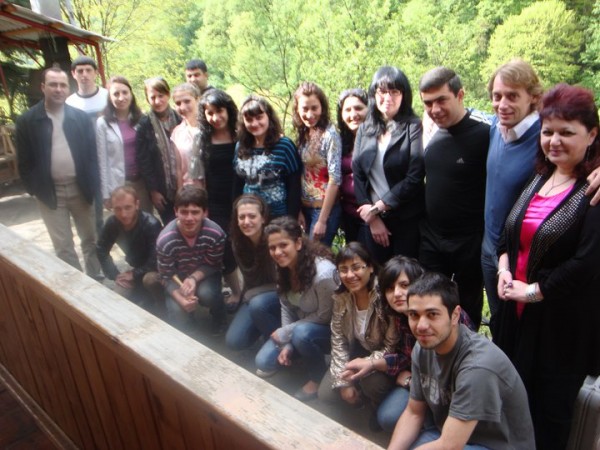
Participants of the HM Foundation's Strategic Planning Training in Dilijan with trainer Bjorn Kulp (second from right, standing).
The training encompassed three main components: Strategic Planning, Future Search and World Café. Utilizing interactive methods and techniques, Bjӧrn Kulp engaged the young leaders and encouraged them to explore a whole realm of possibilities with regard to setting a clearly defined vision for their respective organizations.
The first 1.5 days were spent learning about Strategic Planning as a disciplined effort to produce fundamental decisions and actions that shape and guide what an organization is, what it does and why it does it with a focus on the future. Setting strategy is about an organization’s objectives, setting goals and devising an approach to achieve them. Bjӧrn Kulp outlined the five steps of strategic planning: a) developing a work plan, b) articulating mission and vision, c) data generation/analysis (SWOT technique), d) strategic directions, and e) completing the written plan – strategic plan.
Future Search is based on a concept by futurologist Robert Jungk, which outlines methods to develop alternative futures, to find solutions for problems, to take decisions and the realization of actions and for cooperative working and holistic learning. The aim of Future Search is to make participants aware of their problems, ideas, wishes and concepts. Basically the idea of Future Search is to serve as a catalyst to develop new and creative ideas to solve problems in the future.
World Café, the final component of the training, is an innovative yet simple methodology for hosting conversations about questions that matter. The idea was developed following the realization that most creative conversations are held during coffee breaks rather than in conferences. Therefore, in a coffee shop setting participants sit around tables and discuss a predetermined question/issue. This process allows conversations to link and build on each other as people then move between tables, cross-pollinate ideas and discover new insights into those questions or issues that are most important in their life, work or community. As a process the World Café can evoke and make visible the collective intelligence of any group thus increasing people’s capacity for effective action in pursuit of common aims.
After three intensive days of training, which provided new ideas, methods and techniques on how to set goals and achieve them, the participants traveled back to Yerevan with a new sense of purpose and a clearer vision of how to effectively work within their organizations.







